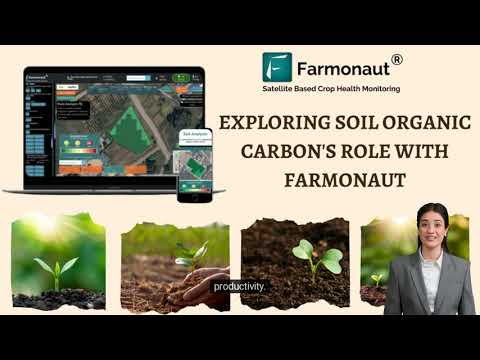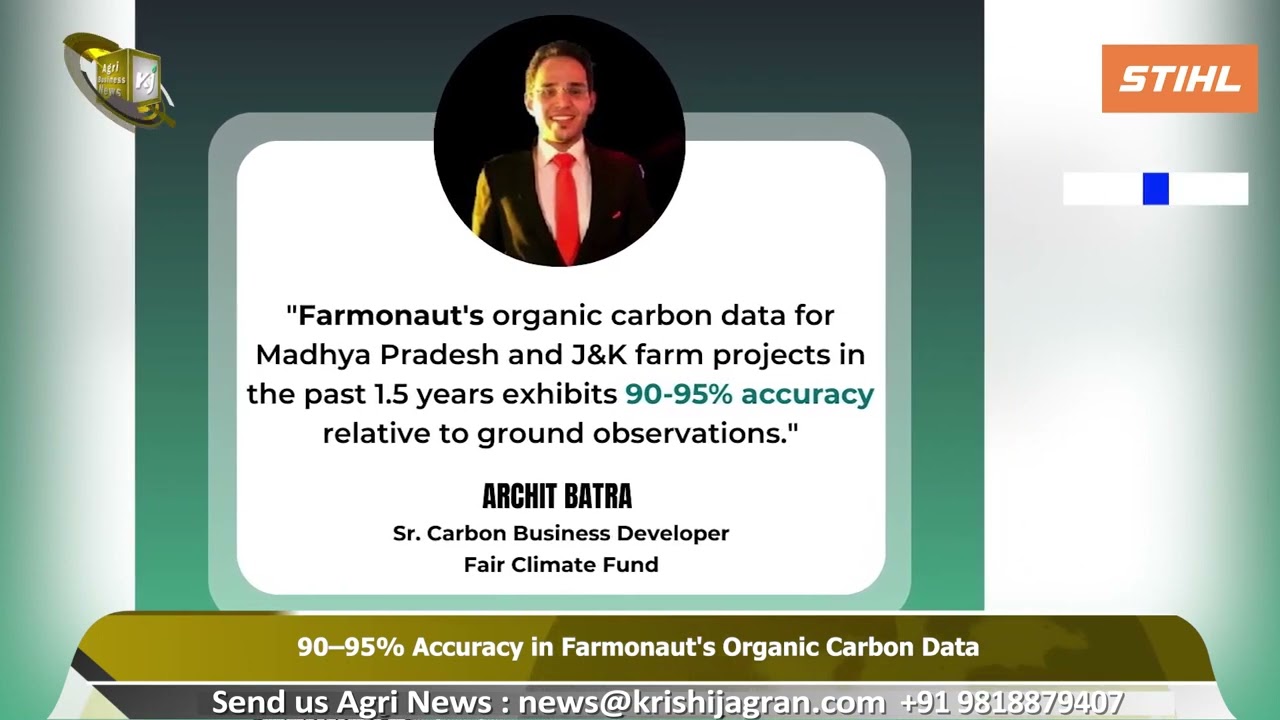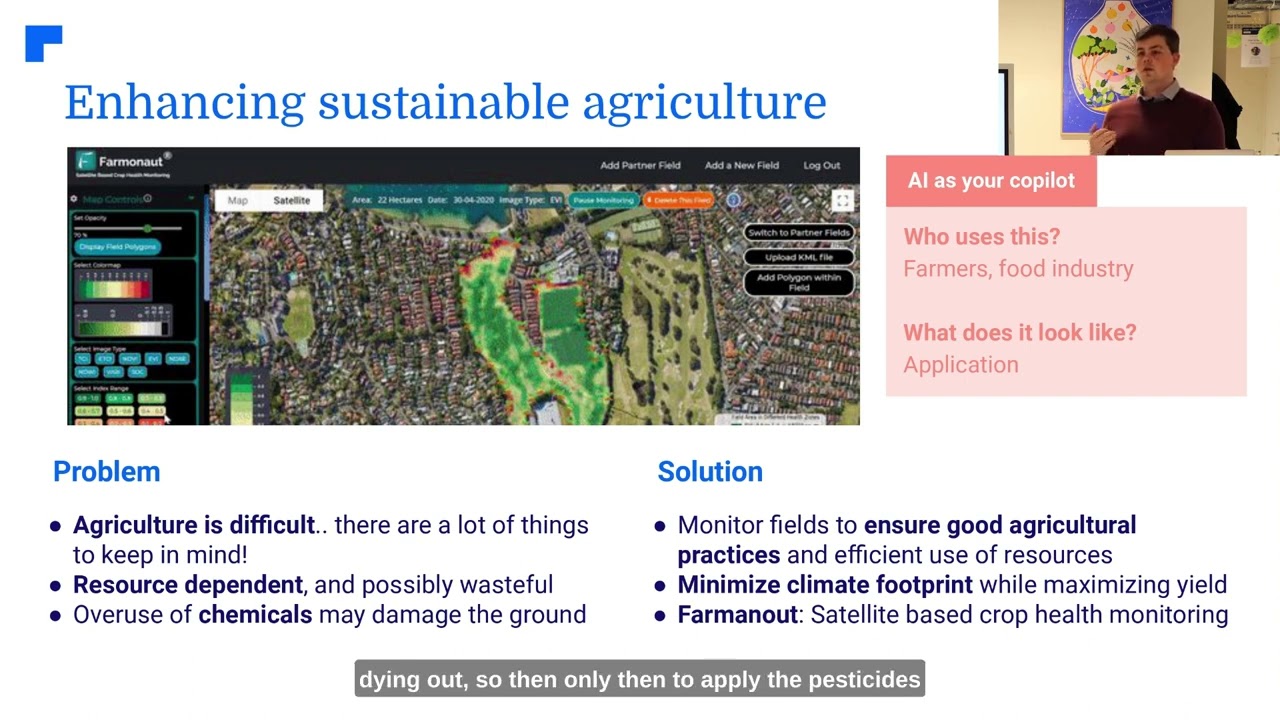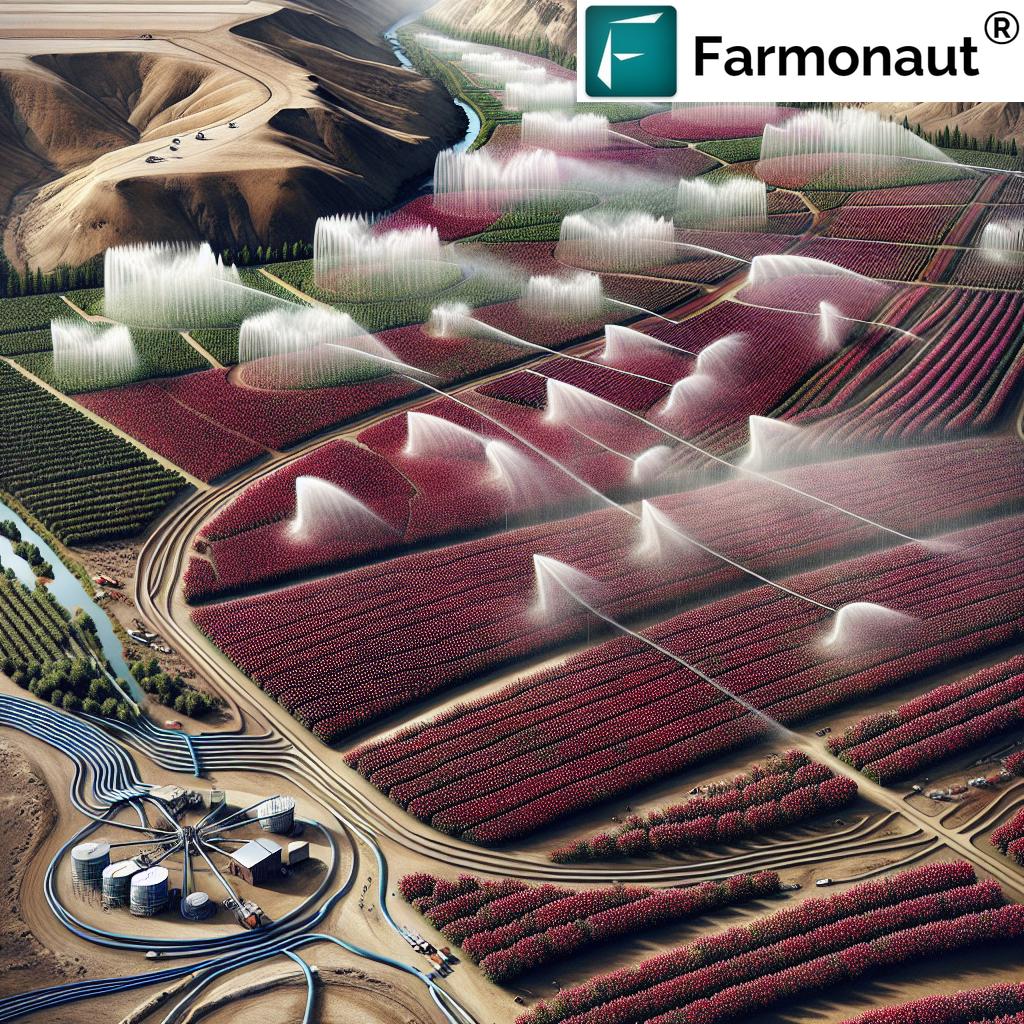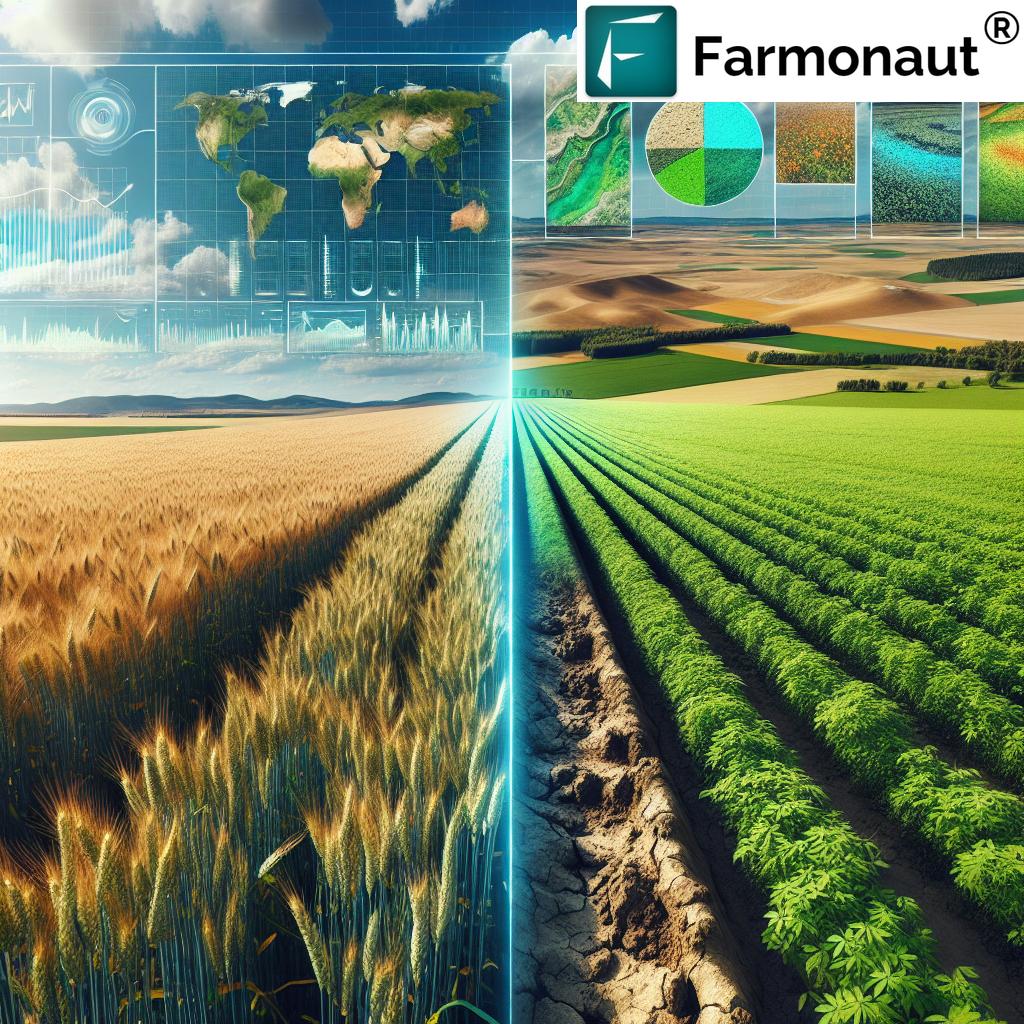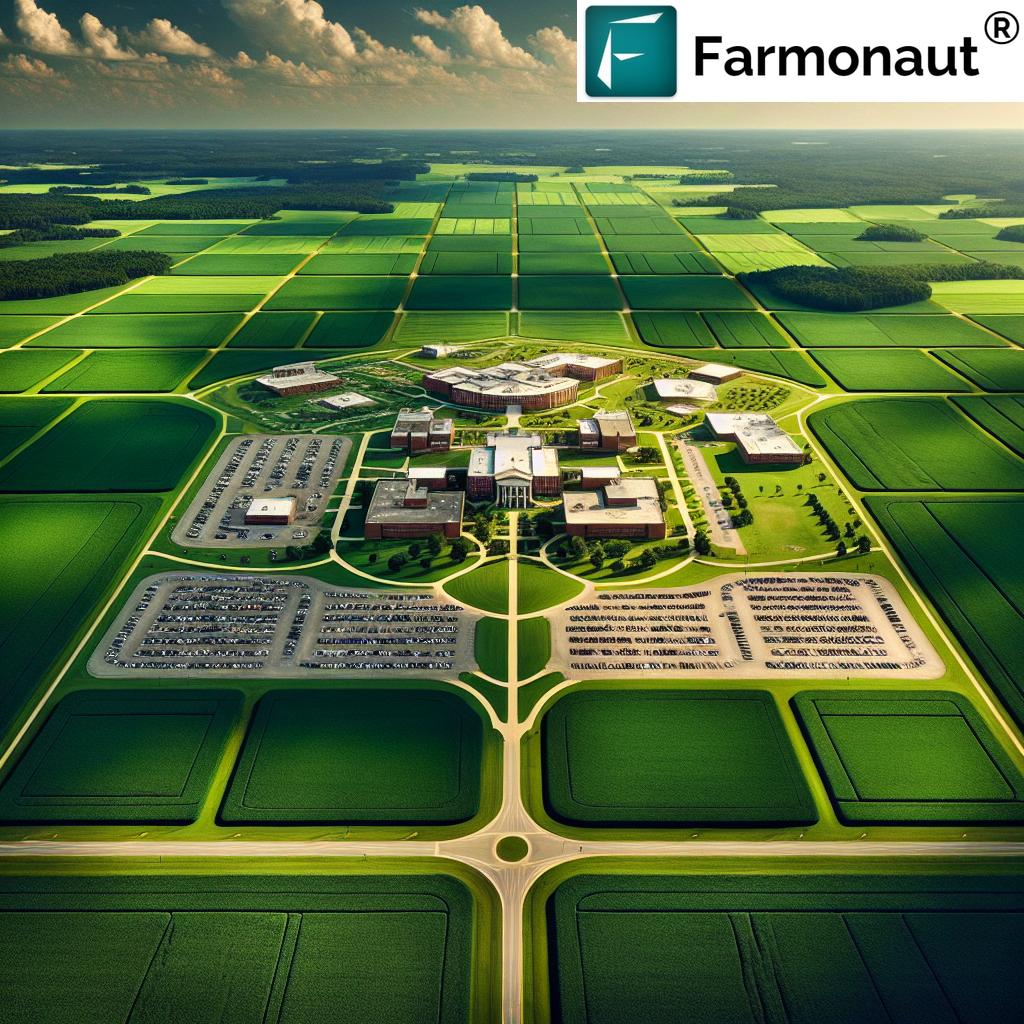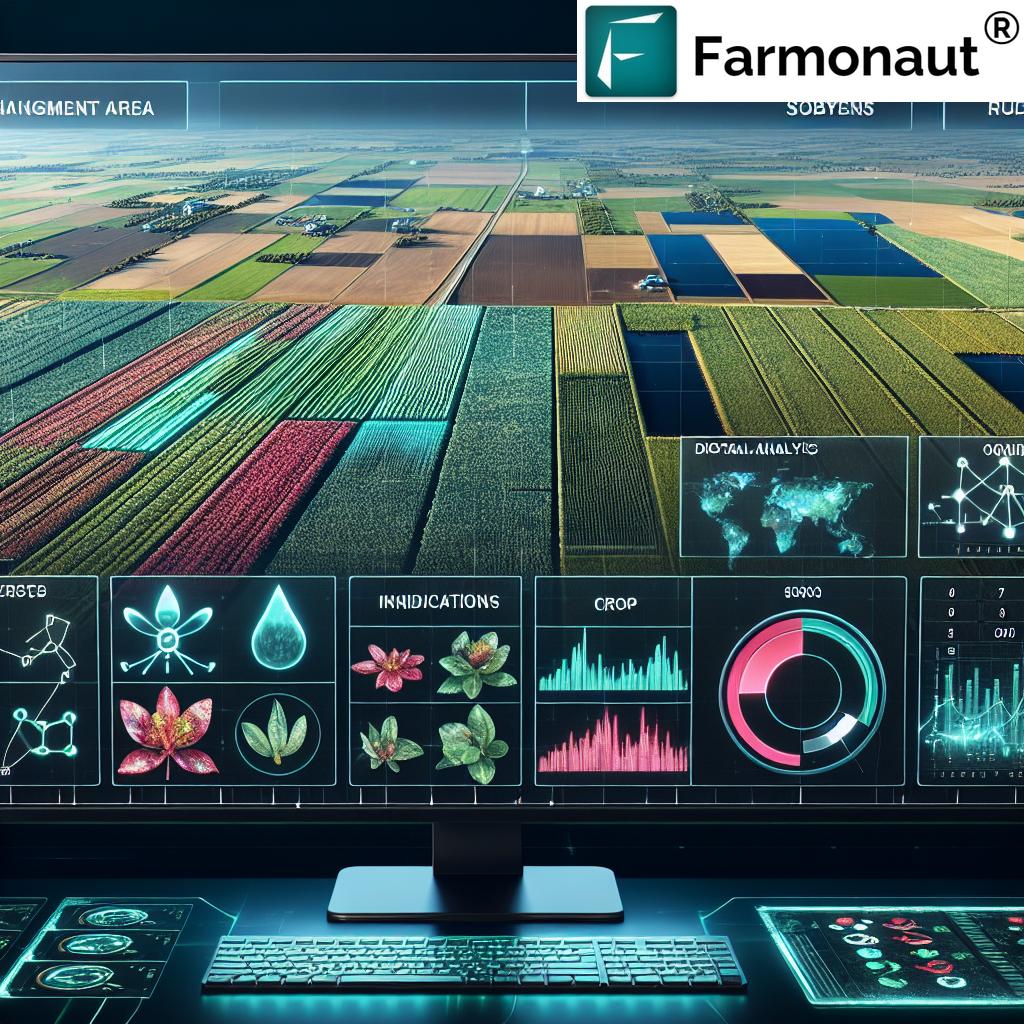Revolutionizing Iowa Farms: How Diversified Cropping Systems Impact Soil Carbon and Sustainable Agriculture

“Diversified crop rotations with manure didn’t increase soil carbon as expected, instead enhancing microbial activity and CO2 emissions.”
In the heart of America’s breadbasket, Iowa’s farms are at the forefront of a revolutionary study that challenges our understanding of carbon sequestration in agriculture and soil carbon dynamics. As we delve into the fascinating world of diversified cropping systems and their impact on soil health, we uncover surprising insights that could reshape the future of sustainable farming practices.
At Farmonaut, we’re committed to advancing agricultural technology and providing farmers with the tools they need to make informed decisions. Our satellite-based crop health monitoring system and AI-driven advisory services align perfectly with the goals of this groundbreaking research. As we explore the findings of this study, we’ll also discuss how our technology can support farmers in implementing more sustainable and efficient farming practices.
The Groundbreaking Study: Challenging Assumptions
Researchers at Iowa State University have conducted a 20-year study that has sent ripples through the agricultural community. The study, published in Nature Sustainability, compared traditional two-year corn-soybean rotations with more diverse three- and four-year rotations that incorporated alfalfa, clover, and oats. These longer rotations also replaced most synthetic nitrogen fertilizer with cattle manure.
The prevailing assumption was that these diversified cropping systems would naturally lead to higher levels of carbon stored in the soil. After all, more diverse crops mean more varied root systems and increased organic matter input. However, the results were far from expected.
Unexpected Findings: The Carbon Conundrum
Contrary to expectations, the study revealed that carbon levels in the soil remained unchanged despite the increased carbon input from these diversified systems. This finding challenges long-held beliefs about the relationship between crop diversity, organic matter input, and soil carbon storage.
Lead co-author Wenjuan Huang emphasized the significance of these results, stating that they could have important implications for various carbon market initiatives aimed at mitigating climate change. The study’s findings highlight the complex nature of soil ecosystems and the intricate balance between carbon input and microbial activity.
The Role of Microbial Activity
One of the key factors behind these unexpected results is the role of microbial activity in the soil. The study found that the addition of organic matter through diverse crop rotations and manure application stimulated microbial activity. This increased activity led to higher decomposition rates and, consequently, increased carbon dioxide emissions.
In essence, the microbes were working overtime, breaking down not only the newly added organic matter but also existing organic matter from previous crops. This accelerated decomposition effectively counterbalanced any gains in soil carbon that might have occurred from the increased carbon inputs.
The Carbon-Chasing Method: A New Approach to Soil Analysis
To gain deeper insights into the carbon dynamics at play, the researchers employed an innovative “carbon-chasing” method. This approach, partially funded by the U.S. Department of Agriculture, allowed for more sophisticated modeling to predict changes in soil carbon.
“Innovative carbon-chasing methods in the study provided deeper insights into soil ecosystems and the microbial food chain.”
By analyzing stable carbon isotopes in the emissions from soil cores, the researchers were able to trace the origin of the carbon dioxide being released. This method revealed that the accelerated decay rates were not only consuming the additional carbon inputs but also utilizing earlier organic matter from prior corn plants.
This sophisticated approach to soil analysis opens up new possibilities for understanding the long-term impacts of different farming practices on soil health and carbon storage. At Farmonaut, we’re excited about the potential of integrating such advanced analytical methods with our satellite-based monitoring systems to provide even more comprehensive insights to farmers.
Climate Benefits of Diversified Cropping Systems
While the study’s findings regarding soil carbon storage were unexpected, it’s crucial to note that diversified cropping systems still offer significant climate benefits. These benefits include:
- Reduced reliance on synthetic fertilizers
- Lower emissions of nitrous oxide, a potent greenhouse gas
- Improved soil health and structure
- Enhanced biodiversity
- Increased resilience to climate variability
The study found that the longer crop rotations resulted in a 70% higher rate of converting organic nitrogen into plant-available inorganic nitrogen. This increased nitrogen availability is crucial for crop growth, particularly for corn, which is a nitrogen-hungry crop.
By reducing the need for synthetic fertilizers, these diversified systems can significantly lower emissions of nitrous oxide. The study estimates a reduction in greenhouse gas emissions equivalent to 60-70% of carbon dioxide through this mechanism alone.
Implications for Sustainable Agriculture Practices
The findings of this study have far-reaching implications for sustainable crop rotation and nitrogen management in crops. While the results challenge some assumptions about carbon sequestration, they reinforce the importance of holistic approaches to sustainable agriculture.
Here are some key takeaways for farmers and agronomists:
- Balanced approach to soil health: While increasing soil carbon may not be as straightforward as previously thought, diversified cropping systems still contribute to overall soil health through improved structure, water retention, and nutrient cycling.
- Efficient nitrogen management: The study highlights the potential for reduced synthetic fertilizer use through strategic crop rotations and organic matter management.
- Climate-smart agriculture: Despite not directly increasing soil carbon storage, diversified systems offer significant climate benefits through reduced greenhouse gas emissions and improved resilience.
- Holistic view of sustainability: The research underscores the need to consider multiple factors when assessing the environmental impact of farming practices, rather than focusing solely on carbon sequestration.
At Farmonaut, we understand the complexity of these issues and strive to provide farmers with tools that support informed decision-making. Our satellite-based crop monitoring and AI-driven advisory services can help farmers implement and optimize diversified cropping systems, ensuring they reap the full benefits of these sustainable practices.
The Role of Technology in Advancing Sustainable Agriculture
As we navigate the complexities of sustainable agriculture, technology plays an increasingly crucial role. At Farmonaut, we’re at the forefront of this technological revolution, offering innovative solutions that support farmers in their journey towards more sustainable and efficient practices.
Our satellite-based crop health monitoring system provides real-time insights into vegetation health, soil moisture levels, and other critical metrics. This data empowers farmers to make informed decisions about irrigation, fertilizer usage, and pest management, ultimately optimizing crop yields while minimizing resource wastage.
Furthermore, our Jeevn AI Advisory System delivers personalized farm advice, weather forecasts, and expert crop management strategies directly to farmers. By analyzing satellite data and other inputs, Jeevn AI generates customized recommendations that can help farmers implement and optimize diversified cropping systems effectively.
Comparative Analysis of Cropping Systems and Their Environmental Impacts
| Cropping System Type | Soil Carbon Levels (est. tons/acre) | Microbial Activity | CO2 Emissions (est. tons/acre/year) | Synthetic Fertilizer Use (est. lbs/acre) | Nitrous Oxide Emissions (est. kg N2O/acre/year) | Overall Soil Health | Climate Benefit Score (1-10) |
|---|---|---|---|---|---|---|---|
| Diversified with Livestock Manure | 55 | High | 2.5 | 50 | 1.5 | Excellent | 8 |
| Traditional Corn-Soybean Rotation | 50 | Medium | 2.0 | 200 | 5.0 | Fair | 5 |
| Monoculture (Continuous Corn) | 45 | Low | 1.8 | 250 | 7.0 | Poor | 3 |
This table provides a clear comparison of different cropping systems and their environmental impacts. While the diversified system with livestock manure shows higher CO2 emissions due to increased microbial activity, it also demonstrates excellent soil health, reduced synthetic fertilizer use, and lower nitrous oxide emissions. This aligns with the study’s findings and highlights the complex trade-offs in sustainable agriculture.
The Future of Sustainable Agriculture: Balancing Trade-offs
As we move forward in our quest for more sustainable agricultural practices, it’s clear that we must carefully balance various factors. The study from Iowa State University highlights the complexities involved in managing soil health, carbon sequestration, and greenhouse gas emissions.
While diversified cropping systems may not directly increase soil carbon storage as previously thought, they offer numerous other benefits that contribute to overall sustainability and climate change mitigation. These include:
- Improved soil structure and water retention
- Enhanced biodiversity both above and below ground
- Reduced reliance on synthetic inputs
- Increased resilience to climate variability
- Lower overall greenhouse gas emissions
At Farmonaut, we’re committed to supporting farmers in navigating these complexities. Our technology provides valuable insights that can help optimize crop rotations, manage resources efficiently, and implement sustainable practices tailored to each farm’s unique conditions.
Implications for Policy and Carbon Markets
The findings of this study have significant implications for agricultural policy and carbon markets. As we better understand the complexities of soil carbon dynamics, it becomes clear that policies and incentives need to take a more holistic approach to sustainable agriculture.
Carbon markets and sustainability initiatives should consider:
- The full range of environmental benefits provided by diversified cropping systems, beyond just carbon sequestration
- The importance of reduced greenhouse gas emissions, particularly nitrous oxide
- The long-term benefits of improved soil health and structure
- The need for more sophisticated monitoring and verification methods to accurately assess the environmental impact of different farming practices
At Farmonaut, we’re actively working on developing tools and methodologies that can support these more comprehensive assessments of agricultural sustainability. Our satellite-based monitoring systems and AI-driven analytics can provide valuable data for policymakers and carbon market participants.
The Role of Precision Agriculture in Sustainable Farming
As we continue to explore the complexities of sustainable agriculture, precision farming techniques are becoming increasingly important. These methods allow farmers to optimize their practices based on detailed, site-specific data.
Farmonaut’s technology plays a crucial role in this area by providing:
- High-resolution satellite imagery for precise crop monitoring
- AI-driven analytics for early detection of crop stress and disease
- Customized recommendations for resource management
- Tools for tracking and reducing carbon footprint
By leveraging these technologies, farmers can implement diversified cropping systems more effectively, ensuring they maximize the benefits while minimizing potential drawbacks.
Conclusion: Embracing Complexity for a Sustainable Future
The groundbreaking study from Iowa State University challenges some of our assumptions about carbon sequestration in agriculture, but it also reinforces the importance of diversified cropping systems in sustainable farming. While these systems may not directly increase soil carbon storage as previously thought, they offer a wide range of environmental benefits that contribute to overall sustainability and climate change mitigation.
As we move forward, it’s clear that sustainable agriculture requires a nuanced, holistic approach that considers multiple factors beyond just carbon sequestration. At Farmonaut, we’re committed to providing farmers with the tools and insights they need to navigate these complexities and implement truly sustainable farming practices.
By combining cutting-edge technology with a deep understanding of agricultural ecosystems, we can work together to create a more sustainable and resilient food system for future generations.
FAQ Section
Q: What are diversified cropping systems?
A: Diversified cropping systems involve growing a variety of crops in rotation, as opposed to monoculture practices. These systems often incorporate different plant species, such as grains, legumes, and cover crops, to improve soil health and reduce reliance on synthetic inputs.
Q: How do diversified cropping systems impact soil carbon?
A: Contrary to previous assumptions, the study found that diversified cropping systems didn’t increase soil carbon levels as expected. Instead, they enhanced microbial activity, which led to increased carbon dioxide emissions, offsetting potential gains in soil carbon storage.
Q: What are the benefits of diversified cropping systems?
A: Despite not increasing soil carbon as expected, diversified cropping systems offer numerous benefits, including improved soil structure, enhanced biodiversity, reduced reliance on synthetic fertilizers, lower nitrous oxide emissions, and increased resilience to climate variability.
Q: How can farmers implement sustainable crop rotations?
A: Farmers can implement sustainable crop rotations by diversifying their crops, incorporating legumes and cover crops, using organic fertilizers like manure, and leveraging precision agriculture technologies to optimize resource use and monitor crop health.
Q: What role does technology play in sustainable agriculture?
A: Technology, such as Farmonaut’s satellite-based crop monitoring and AI-driven advisory services, plays a crucial role in sustainable agriculture by providing farmers with real-time data and insights to optimize their practices, reduce resource use, and implement more sustainable farming methods.
Earn With Farmonaut: Affiliate Program
Earn 20% recurring commission with Farmonaut’s affiliate program by sharing your promo code and helping farmers save 10%. Onboard 10 Elite farmers monthly to earn a minimum of $148,000 annually—start now and grow your income!
Farmonaut Subscriptions
As we continue to navigate the complexities of sustainable agriculture, Farmonaut remains committed to providing innovative solutions that support farmers in their journey towards more efficient and environmentally friendly practices. Our technology combines satellite imagery, artificial intelligence, and expert knowledge to deliver actionable insights that can help farmers implement and optimize diversified cropping systems.
For more information on how Farmonaut can support your sustainable farming efforts, visit our API page or check out our API Developer Docs. Together, we can build a more sustainable and resilient agricultural future.


